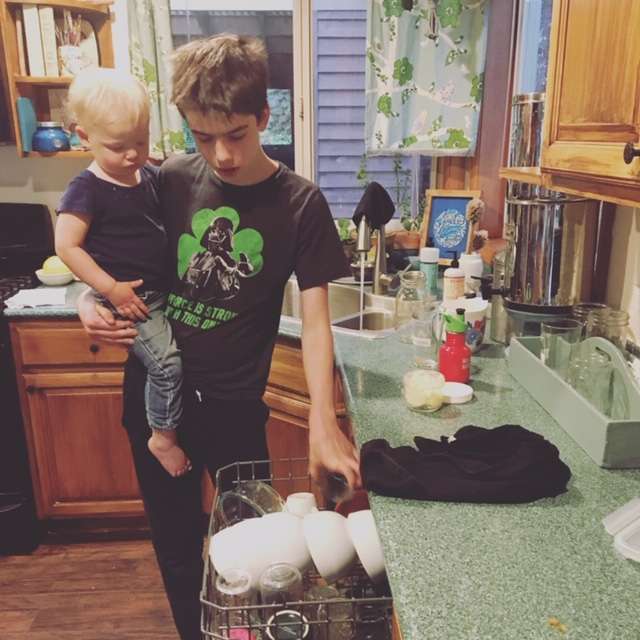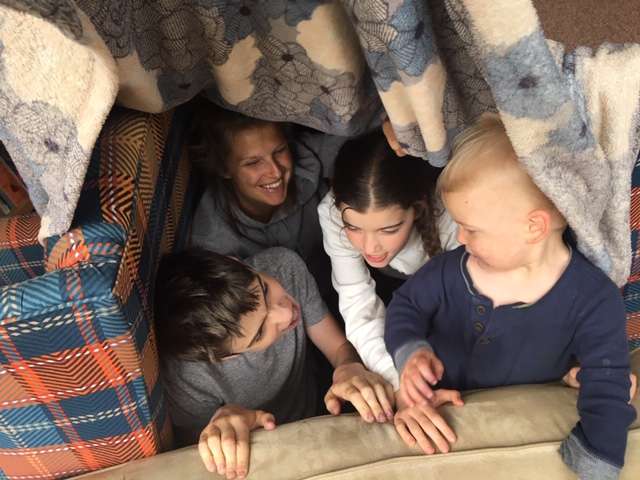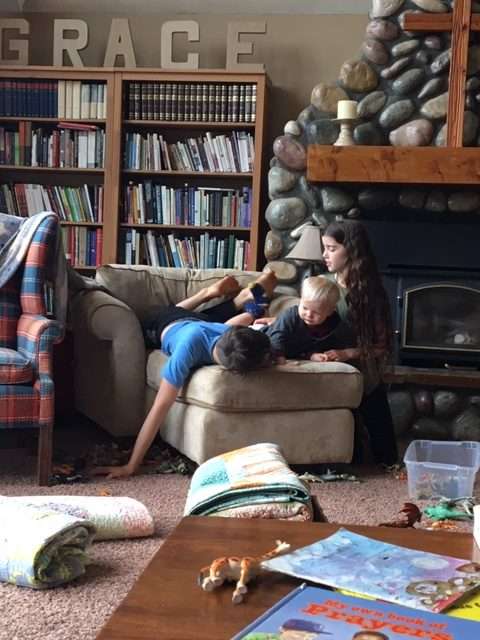5 benefits of multi-ages learning together
Written by Kari Patterson
Teaching multiple ages at once is hard.
This is one of the most common homeschool complaints I hear (usually from myself!). The struggle is real: We’ll have a 14-year age span between the oldest and youngest of our children when our next son is born this fall.
Currently, one son is learning to shave while the other is learning to keep his hands out of his poopy diaper. We also share our home with another homeschooling family, so the total age-range of kids educated on these premises will be 18 years.
I also have (wonderful!) aging parents, including a disabled mom, with whom we spend much of our time (there will be an almost 79-year-old age difference between my dad and my youngest son). Our 11-year-old daughter regularly feeds my mom, cleans her hands and fingernails, brushes her hair, and reads aloud to her.
I mention these dynamics simply because they have shaped my perspective on age segregation, and convinced me that although learning (and living!) with a wide age-range has its challenges, it offers priceless benefits that simply aren’t available in a sea of same-aged students.
While I won’t hit on the how during this article, I want to convince you the work is worth it! A few of the great benefits include:
1. We learn to love those different from us.
For all the valiant efforts made toward tolerance of those different from ourselves, the family provides ample opportunities for honoring others above ourselves.
Consider: Are the most pressing problems in our world the result of not knowing our prepositions? Or are they the result of not knowing how to love, listen to, and accept those different from ourselves?
If young siblings can learn to reasonably reconcile differences or thoughtfully discuss a difficult situation, aren’t they ahead of many adults these days?
2. We’re blessed by friendships outside our birth year.
In terms of friendship, I feel filthy-rich. I have been blessed abundantly with dear friends, and it’s interesting to me that of my 10 closest friends, only one is my age. The rest cover a twenty-five year age range!
When we made the decision to homeschool our own children I was concerned whether they would have close, trusted friends. I am so grateful that they both do … but none of them are my children’s same age. Their dozen or so “besties,” who they ask to play with most often, range from 15 years down to 5 years … not to mention the toddlers trailing along desperately trying to keep up with the fun!
In my experience, a common pitfall is trying to “find” friends by looking for people who are just like us. It seems like a reasonable approach, but it backfires because the richest kind of friendship isn’t based simply on sameness but on serving one another and a greater good.
It’s so much bigger than a shared birth year or merely common interests. Learning to make friends with those who are older, younger, and different enriches beyond measure.
3. Our education is enriched by the skills and perspectives gained through wide interactions.
Age and generation segregation robs us of so much richness. Our schools, workplaces, and even places of worship have become increasingly segregated, and I don’t think we’re better as a result. We need the wisdom of the aged, just as they need the insights and innovations of the young.
But if we never interact, if we don’t value what the other has to offer, how will be both benefit?
According to a study of adults age 60 years and older, less than a quarter had discussed anything “important” with someone age 36 or younger, and if family was excluded the number dropped to 6 percent! I want my children to be learning from, listening to, caring for, and valuing those whose life experiences are vastly different from their own.
If my 13-year-old son can do dishes with a toddler on his hip, patiently teach his sister how to add fractions, and engage in a thoughtful, respectful conversation about American history with a 78-year-old, all in one day, I’d say that’s a good start!
Add chores, a run with his 42-year-old father, and some Charles Dickens, and we’re well on our way to a well-rounded education.
4. We foster healthy ambition more than unhealthy competition.
University of Arizona anthropologist Alice Schlegel studied 186 preindustrial cultures and found that age segregation “is closely correlated to antisocial behavior and to socialization for competitiveness and aggressiveness.”
She also found that older kids who spent time with younger kids tended to be more nurturing, while the younger kids learned concrete lessons about coming stages and how to navigate communities larger than themselves (i.e. the world doesn’t revolve around them).
My personal perspective is that fostering competition among peers, while an effective means of motivating students in the short-term, eventually backfires because it cultivates selfishness rather than true greatness.
Instead, older students can be inspired to greatness by exposure to virtuous, wise, and courageous adults (via literature and life) while also recognizing that they themselves are serving as an example for the little ones looking up to them.

Similarly, younger students are inspired to grow and learn not because they can “beat” their classmates, but because they aspire to the competency of their older siblings and friends.
5. We develop a healthy awareness of our strengths and weaknesses.
One of the challenges faced when schooling siblings of different ages is that at some point a younger sibling will probably surpass an older sibling in some subject or skill, and both will face a dangerous temptation: The older child is tempted to despair and feel like a failure and the younger child is tempted to boast or feel superior.
Although this is a painful scenario, I am convinced it’s one of the most valuable lessons our children can learn. In real life we must all face the reality that others, many of whom are younger or less-experienced, will surpass us.
Our children need to know that their worth and value doesn’t come from “being the best” in any skill or subject. Any identity that depends on comparing our performance to those around us isn’t an identity worth having.
This is a prime opportunity to affirm the value and worth of the struggling child, and to encourage them to work that much harder to gain competency.
Similarly, the over-achieving child must learn modesty and humility or it won’t matter how gifted they are! This is the perfect opportunity for these rare but precious qualities to be encouraged in the younger child.
Chances are, you already know it’s difficult to invest in a wide age-range, but I hope I can convince you afresh that it’s worth it.
We all benefit from being surrounded by those a little ahead, a little behind, and a little different. Home is an outstanding opportunity to take full advantage of these benefits, even if it does require some work.
What benefits have you seen from having multiple ages together?
What’s Your Homeschool Mom Personality? Take Jamie’s quiz now and receive a free personality report to help you organize your homeschool based on what your personality type needs most!



This is excellent! Thank you for these wise words, Kari!
Thank you, friend!
My home-educated son is grown now, but what Kari writes in this post is extremely accurate. I can state that based upon input shared with us by our son.
We started homeschooling toward the end of grade three. By the age of 18 our son had not only graduated from high school, but had also earned an Associate of Arts Degree. Involvement in his community college courses, home-school groups, church, scouting, community theater exposed him to a WIDE range of unique people.
In the autumn of his 18th year he headed off to university. It was the first time in 9 years that he had been placed in a setting where his peers were clustered so near to his own age. Immediately he called us and told us how much he missed the presence of older adult students in his classes. He spoke of how much those students has added and benefitted his education. He testified that a true depth was missing in his final two years of higher education because all of the students were his own age…and shared a lack of experience as they approached the topics they studied.
Homeschooling is a GREAT GIFT to your children. It is a pleasure to read of you parents, children, grandparents pouring so much into those God has entrusted to your care.
Oh wow, thank you so much Barbara! I LOVE hearing stories of homeschool parents whose kids have graduated, and learn from their experiences. This is very encouraging.
Kari,
This is a very well written and inspiring article. The struggle is real! Why do we doubt ourselves and sometimes think we aren’t/can’t make a difference? I work from home and my wife homeschools our 8 and 6 year old while supervising (let’s be honest… policing…lol) our 4 and 2 year old. This is the reason we homeschool not just to fill them with knowledge but to teach them how to be life long learners, how to love and be loved, and how to make a difference in this world.
I LOVE this, Kari, and I totally agree. I often think about how much my kids would be missing out on if they weren’t learning with each other. I think it’s equally good for my youngest and oldest, and I often wish I had more than two kiddos because of it.
(I love that pic of your son with the baby on his hip, by the way. It gives me all kinds of feelings!)